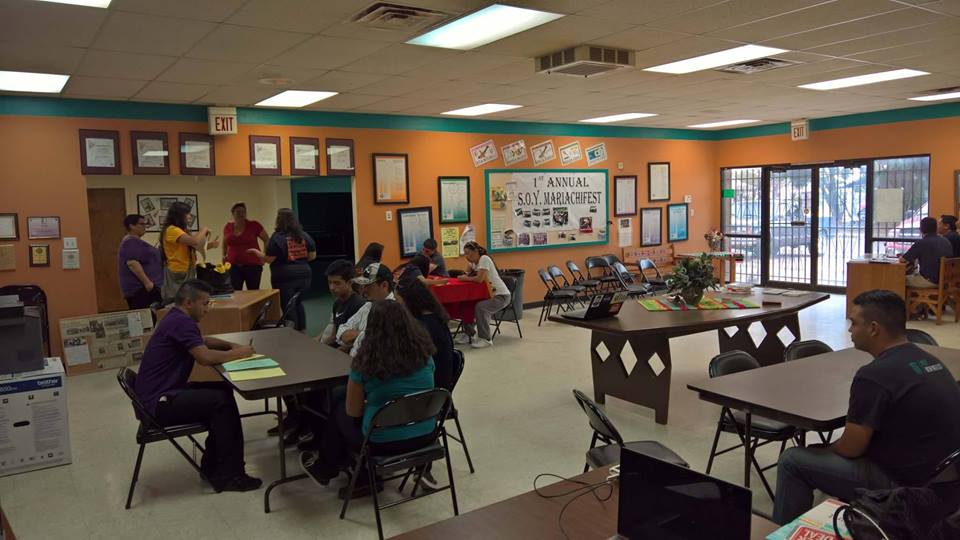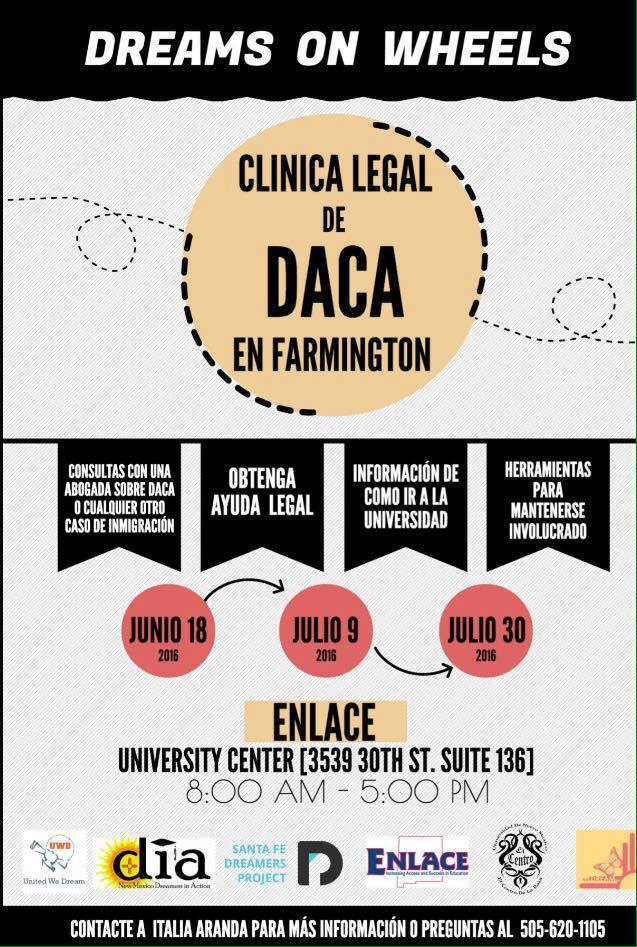New Mexico Dream Team: Dreams on Wheels
A program led by undocumented youth for undocumented youth that advocates for Deferred Action for Childhood Arrivals (DACA) and other immigrant rights.Participants
- Prospective college students with undocumented legal status
- Families of undocumented youth
- Immigration lawyers who provided free legal assistance
Desired Outcomes?
To provide undocumented Americans in rural towns with the opportunity to apply for DACA for free and to educate undocumented Americans about their rights.
How Dreams on Wheels Builds Relationships
Dreams on Wheel attempts to build bridges among rural and urban communities in New Mexico that connect resources and opportunities for self-empowerment for immigrant youth and their families. By providing access to legal services and free DACA clinics, Dreams on Wheels provides spaces where individuals can talk about their experiences, their struggles, and the needs of their own communities. Dreams on wheels takes an advocacy approach by providing tools and opportunities for true engagement and encouraging local communities to lead their own advocacy efforts.
Costs
- Transportation: $3,000 per year for gas, depending on the location of rural towns visited
- DACA applications: $465 per application, paid by families
Time Resources
The time Dreams on Wheels spends within each rural community depends on the community’s context.
Other Resources
- Office supplies
- Paper for flyers
Partners
- United We Dream
- Santa Fe Dreamers Project
- New Mexico Dreamers in Action (NMDIA)
- El Centro de La Raza
- ENLACE
- Listo New Mexico
- Soy Mariachi
- Bobby Villegas
- New Mexico Immigrant Law Center

Our Story: "Why not let the people affected by problems have a seat at the table?"
Dreams on Wheels adapts its provision of DACA services to each town’s context. Factors such as proximity to border patrol checkpoints, racism, and fear impede Dreams on Wheels’s services. Towns’ political leanings influence the extent to which Dreams on Wheels can interact with communities. Dreams on Wheels efforts are complicated by mistrust that comes from a heavily politicized situation. Because of the vulnerability of the undocumented population, Dreams on Wheels rarely engages in large-scale community events. Instead, Dreams on Wheels organizers often find a location free of charge, such as a church or a school, to set up a table with information about their services. A first step to building a relationship with a new community might even be the simple question, “Can we leave flyers here?” In this way, Dreams on Wheels gives people in the towns they visit the choice to visit advocates on their own terms.
Building trust with people of undocumented status takes more than providing information. To establish trust, Dreams on Wheels advocates prioritize listening to the voices of the communities they reach out to. Even so, families sometimes send a friend who is a documented American to investigate whether Dreams on Wheels seems trustworthy. When families do come to Dreams on Wheels with a request or a problem, advocates respond first with the question, “What can we do for you?” After all, communities are their own experts. Organizer Estefany Gonzalez also notes that letting undocumented community members “get to know us” and “see how we are similar” heightens the sense of solidarity between them and Dreams on Wheels workers. Many Dreams on Wheels representatives are also undocumented Americans from rural towns who qualify for DACA and therefore have an acute understanding of the challenges facing the undocumented community.
Dreams on Wheels values fostering trust with both community members and with other advocacy organizations. All NMDT members who attend Dreams on Wheels clinics receive training from immigration attorneys at Santa Fe Dreamers Project and the New Mexico Immigrant Law Center. Dreams on Wheels also tries to coordinate with local advocacy groups so as not to offer services already available in a town through local groups. Estefany maintains that “when we form partnerships, that’s how we can learn and grow.”
When we form partnerships, that’s how we can learn and grow.
Currently, the New Mexico Dream Team has five chapters around the state, at two colleges and three high schools. Most of the chapters are in central New Mexico, around Albuquerque, but one is in Southern New Mexico, in Anthony. The Dream Team also offers educational workshops for teachers who have students with undocumented status.
Benefits
Dreams on Wheels allows students with undocumented status to apply for DACA without cost. By reaching out to rural areas that don’t have easy access to legal and informational resources, Dreams on Wheels allows people to circumvent high legal fees. Listening to and validating the voices of undocumented youth and their families empowers them to advocate for change in their communities.
Things to Remember
- Remember to put the needs and voices of those affected by the problem you wish to solve first.
- Engage with the community and modify your programs based on the local context of the community, but let the community members lead their own activism.
- Share resources with your community and your partners.
- Ask yourself the question, “what am I really doing here?” to maintain the roots of your motivation to serve.
- Talk about race and racism—you cannot talk about immigration in America without the context of race.
- Take time to heal yourself from the pain and difficulty of your work.
Challenges
Dreams on Wheels advocates often encounter low trust from the communities they visit. People fear risking their livelihoods. Finding funding for transportation to and from rural towns, office supplies, and other materials can also be a challenge. The Dream Team’s partnership with the 501(c)(3), United we Dream, helps the Dream Team acquire some of these resources.
